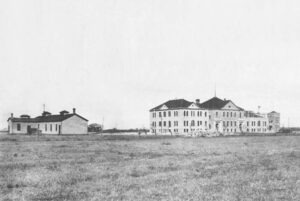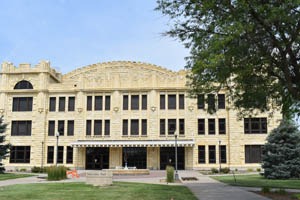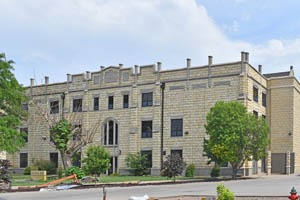Fort Hays State University (FHSU) is the fourth largest of the six state universities in Kansas. It is located in Hays, Kansas.
After Fort Hays closed in 1889, the state legislature requested that the Fort Hays reservation be donated as a site for a branch of the state agricultural college, a branch of the state normal school, and a public park in 1895. However, no action has been taken regarding this request. In 1899, the Interior Department declared the land open for settlement. Fortunately, in March 1900, the Kansas delegation in Congress successfully secured the land and buildings for educational purposes. In 1901, the legislature passed a law establishing the Fort Hays Experiment Station, which is part of Kansas State University, and designated approximately 4,000 acres for the Western Branch State Normal School.
The Western State Normal School began with a summer session in June 1902. The first regular term opened in September, and 23 students enrolled.
The school was conducted in the old fort buildings until 1904, when the central portion of the main building was ready for occupancy. At that time, another large building closer to the city was also completed, and the college officially moved to its present location.
By 1910, total enrollment had increased to nearly 1,000 students. In 1914, the Western Branch of the State Normal School separated from the school in Emporia and became known as Fort Hays Kansas State Normal School. During this time, the tiger mascot was adopted, although the reason for its selection remains unclear. In 1923, the institution was renamed the Kansas State Teachers College of Hays, and in 1931, it became Fort Hays State College. In 1977, it was elevated to university status.
The campus spans 200 acres and features over 40 limestone-faced buildings. It is located just west of the Hays business district, two miles south of Interstate 70. Currently, nearly 10,000 students are enrolled in more than 60 undergraduate majors and 19 graduate programs. The university also offers a wide range of online degrees through its “Virtual College,” catering to students who are unable to attend classes on campus. It is one of only two universities in the state that offers agriculture as a major. The athletics programs include football, volleyball, cross country, basketball, wrestling, baseball, softball, track and field, tennis, golf, rodeo, and shotgun shooting sports.
On campus, the Sternberg Museum of Natural History features interactive natural science exhibitions and houses over 100,000 square feet of dinosaurs, fossils, prehistoric animals, giant sea-swimming lizards, and fish that inhabited Kansas over 70-80 million years ago. The museum also features many traveling and temporary exhibitions, an acclaimed Discovery Room, and a Museum Store.
At the Forsyth Library, visitors will find not only materials that support the general needs of faculty, staff, and students but also an extensive collection of fiction and nonfiction material about the American West on such topics as the railroads, the cattle industry, cowboys, Native Americans, and frontier life. The William D. Paschal World War II History Collection contains books, declassified government documents, maps, photographs, and other materials. The library is also the repository for the books, papers, and periodicals of the Fort Hays Genealogy Society.
Also located on campus is the Plymouth Stone Schoolhouse on the banks of Big Creek. This authentic, one-room schoolhouse, built of limestone in 1874, has been restored and furnished with school antiques and textbooks. Visits are arranged by appointment only by calling 785-628-4538.
More Information:
Fort Hays State University
600 Park Street
Hays, Kansas 67601-4099
785-628-FHSU
©Kathy Alexander/Legends of Kansas, updated June 2025.
Also See:
See Sources.




